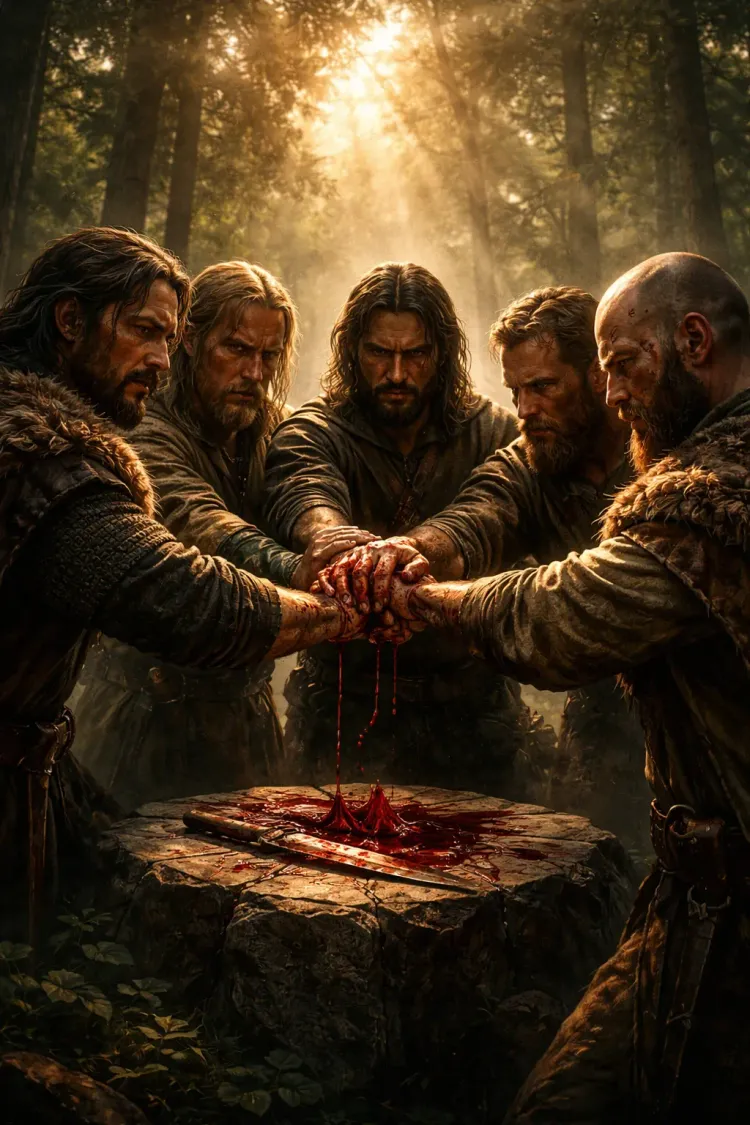Sovereignty: the will to territory

By Colonial
Power is the foundation of sovereignty. It is the capacity to dictate the terms of your existence—to have dominion over your space, your resources, your people. Whether digital or physical, territory is the substrate upon which power is built. And he who controls the territory writes the rules.
This is not a political theory. It is not a philosophy. It is a biological law. It is the operating system of nature itself. Robert Ardrey called it the Territorial Imperative—the innate drive in all creatures to acquire and defend territory. Nietzsche called it the Will to Power—the fundamental animating force of life. Whether you are a wolf staking out a forest, a lion marking its range, or a man buying land and securing a network, the instinct is the same: to dominate space, and by dominating it, shape reality.
All Life Is Territorial
Every organism lives somewhere, and every organism fights—implicitly or explicitly—for the conditions that define that somewhere. A bacterium colonizing a petri dish and a startup founder scaling a protocol are engaged in the same act: claiming territory.
Robert Ardrey's study of animal behavior revealed that this territoriality was not unique to mammals or predators. Even birds, fish, and insects develop spatial domains, defend them, and reap the reproductive and energetic benefits of ownership. Territory is not an abstraction—it is calories, mates, safety, leverage.
In humans, territorial behavior has evolved past the biological into the symbolic and the civilizational. We erect fences, borders, firewalls, courts, and contracts. But the logic is unchanged. Control territory, and you dictate what happens inside it. Lose territory, and you live at the mercy of someone else’s rules.
But this territory is no longer only dirt and stone. It includes ideas, institutions, language, culture—and increasingly, it includes the digital domain. In the 21st century, the frontier is not only physical; it is informational. The servers you control, the data you own, the code you write, and the networks you inhabit are just as much territory as the land you walk on. A DNS address is a flag planted. A self-hosted site is a homestead. A peer-to-peer encrypted protocol is a fortress wall.
Digital territory obeys the same law: if you control it, you define it. If you build your digital life on land you do not own—cloud services, social media, custodial wallets—you are a tenant, not a sovereign. You play by someone else’s rules, subject to deletion, throttling, or cancellation at a keystroke. You are colonized in the cloud.
True sovereignty demands digital dominion. Run your own comms server. Host your own blog. Store your files on machines you own. Secure your bitcoin with keys only you control. Build applications that do not rely on centralized APIs or gatekeepers. Territory is no longer just a matter of acres—it is also now measured in bandwidth, uptime, cryptographic keys, and root access.
The man who builds without sovereignty builds for his enemies. Every platform you depend on, every service you don’t control, is a potential point of capture. The enemy does not need to storm your castle when you’re living inside his walls, on his grounds.
Digital sovereignty is not LARPing. It is survival. It is the continuation of the Territorial Imperative into cyberspace. The logic is eternal. Control the territory—physical or digital—and you rule. Surrender it, and you serve.
When Sovereignty Collapses: Rome and Rhodesia
History is littered with the corpses of civilizations that lost control over their territory—and thus lost themselves. Rome, once the sovereign core of the known world, collapsed not because of a single battle, but because its borders became porous, its virtue diluted, and its people indifferent to the responsibility of maintaining dominion. It outsourced its defense. It embraced decadence. And it ceased to believe in itself. What followed was centuries of fragmentation and darkness.
Rhodesia, though far smaller and more modern, tells a similar story. A settler society that carved out a bastion of agricultural and military strength amidst hostile terrain, Rhodesia stood as a symbol of European minority rule and civilizational self-assertion. But it lacked the numbers and the will to expand its territory or maintain long-term sovereignty. When international pressure combined with internal insurgency, it buckled. Power passed to those who neither built it nor could sustain it. Rhodesia became Zimbabwe—and collapsed into economic ruin, tribal violence, and state dysfunction.
Both Rome and Rhodesia demonstrate the same truth: sovereignty is not guaranteed. It is not inherited. It is maintained through strength, clarity, and action—or it vanishes. But this is not merely a lesson for nations or empires—it applies to individuals as well.
When sovereignty is lost, the consequences are catastrophic. When a man cannot control his income, he lives at the mercy of employers, tax collectors, and inflationary regimes. When he cannot speak freely without fear of digital erasure, his thoughts become hostage to algorithms. When he cannot protect his home, his children, or his body, he is not a man—he is property.
Ask the entrepreneur whose assets were frozen by a bureaucrat. Ask the father who lost custody because he spoke the wrong words online. Ask the farmer who tilled land for decades only to be stripped of it by political fiat. These are not statistics. These are stories of sovereignty lost.
Civilizations collapse the same way individuals do: slowly, then all at once. First they compromise. Then they comply. Then they collapse. The people of Rome believed they were still Roman long after Rome had ceased to be sovereign. The Rhodesians believed they still had a nation even as the gears of foreign influence dismantled it from within. And the modern citizen believes he is free even as every tool of control is held by others.
The loss of sovereignty begins with comfort, continues through dependence, and ends in servitude. The man who will not fight for his ground—his land, his voice, his code, his values—will wake up one day and realize he owns nothing, influences nothing, and passes nothing on.
Only through pain can one begin to grasp what has been surrendered. And only through decisive action can it ever be reclaimed.
Virtue and Dominion
Sovereignty is not just territorial—it is moral. It is not just the ability to hold land, but the capacity to deserve it.
Virtue is not weakness. It is not compliance. True virtue is the disciplined assertion of power. The word itself comes from the Latin "virtus," derived from "vir," meaning man. To the Romans, virtue was manliness—courage, excellence, and the capacity to lead and conquer. It was not passive moralism, but active greatness. Virtue is the restraint of the strong, the mastery of the self, the honor of those who both dominate and choose to elevate. It is the moral shape that power takes when wielded with clarity and discipline.
Dominion is control. And control, in itself, is amoral—neither good nor bad. It simply is. It is a neutral fact of existence, a condition that always belongs to someone or something. In any given system, whether a nation, a company, a household, or a digital network, dominion is never absent—it is merely shifted. If you do not hold it, someone else does. Nature abhors a vacuum, and power even more so.
The greatest men throughout history have sought dominion not out of cruelty, but out of clarity. They understood that to shape reality, one must first command it. Dominion is the precondition of law, order, meaning, and legacy. It is not to be apologized for—it is to be mastered. The sovereign man does not merely react to the world; he organizes it around him through his control of the terrain—be it land, code, culture, or force.
Dominion without virtue is tyranny, and tyranny always fails. But virtue without dominion is cowardice and martyrdom. It's not about balancing the two against each other as many modern teachers would tell you. They go together. More of both is always what is needed. A sovereign man is one who earns his rule—not by democratic consensus, but by the moral authority of excellence. He defends his borders because he has something worth defending. He creates law because he embodies law. Civilizations that forget this collapse from within. The sovereign man must become the archetype again.
Aristocratic Radicalism: The Engine of Territorial Expansion
What modernity lacks is not intelligence but nobility. Aristocratic radicalism—the combination of elite ambition and revolutionary vision—is the only antidote to the blob. It is the mindset of those who do not wait for permission to lead, who do not beg for rights, but instead carve their domains from the wilderness and from the corpses of their enemies.
This was the spirit of the European knight, whose code of chivalry fused brutal territorial dominance with a framework of honor; the Renaissance noble, who combined wealth, war, and patronage to reshape city-states in their image; and the American Founding Fathers, men who risked wealth, status, and death to wrest territorial control from the world’s most powerful empire and erect a new one. These were not bureaucrats or consensus-seekers. They were elite builders who believed in the right—and necessity—of remaking the world according to their vision. They created new orders not through appeals to fairness or equity, but through mastery, conquest, and the unshakable belief in their authority to do so.
Aristocratic radicalism is not conservatism. It does not seek to preserve the past, polish its ruins, or prolong its decline. It seeks to build the future, not just in committee rooms or comment sections, but in blood, risk, sacrifice, and decisive will. It understands that nothing great is built without cost—and that the highest cost is paid by those who lead. The term "aristocratic" comes from the Greek "aristos," meaning the best, the most excellent. Aristocracy in its truest form is not just about lineage but about greatness—about the rule of those with superior vision, courage, and capacity.
Aristocratic radicalism is not merely about wielding a sword. More often, it is about wielding strategy. It is about turning the tide through cunning, through superior understanding of politics, commerce, narrative, and systems. The aristocratic radical may conquer not by brute force but by steering the demos to serve his ends, by interpreting the law to secure his position, by securing wealth in places no one else can touch, by protecting information no one else can see. It is intellectual war, spiritual war, memetic war.
It is how all empires are born, and how dead civilizations are resurrected. It is the force that transforms aristocracy from passive privilege into active destiny—the belief that greatness must be seized, not merely inherited, and that the only legitimacy is creation through conquest, whether by sword or by system.
Territory Creates Sovereignty
To control territory is to become real. Genghis Khan emerged from the steppes not as a philosopher, but as a conqueror—an embodiment of Will to Power in its purest form. He did not seek to justify his actions through ideology or diplomacy. His philosophy was action. His right to dominate territory was innate, rooted in the very fact of his ability to do so. For Genghis Khan, conquest was not a matter of morality but of metaphysical necessity. He did not ask for permission; he asserted his presence. His dominion was its own justification—brutal, effective, and absolute. He unified warring tribes by giving them a mission: expansion. He created a code of law, a system of communication, and a military machine that conquered half the known world. His power did not come from voting, from moral appeal, or from negotiation. It came from victory. He dictated the terms of reality because he owned the ground.
Likewise, the American colonists began not as rebels, but as settlers. They cleared land. They built towns. They raised militias. When the Crown demanded obedience without reciprocity, they declared independence—not because they had an ideology, but because they controlled territory. They had the ability and the will to say no. And because they would say no, they became sovereign.
Sovereignty always starts with territory—digital or physical. It is the basis for all autonomy. Without it, you are a renter in someone else’s world.





